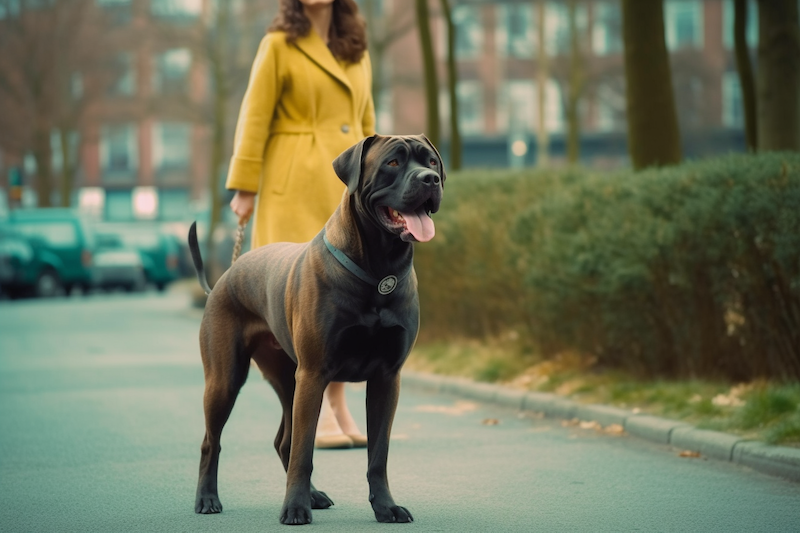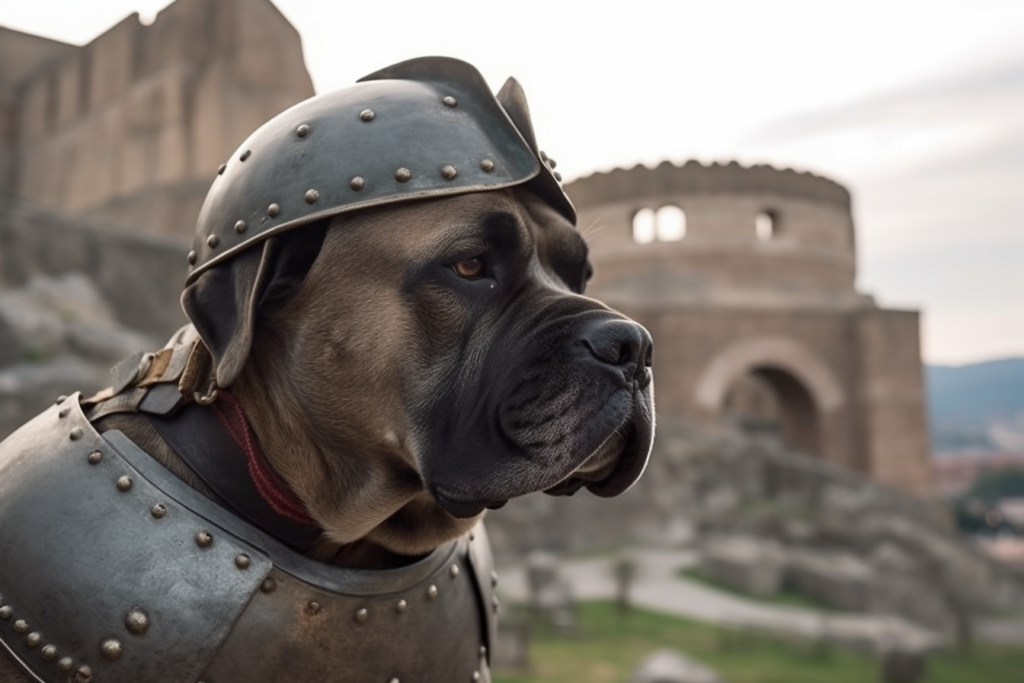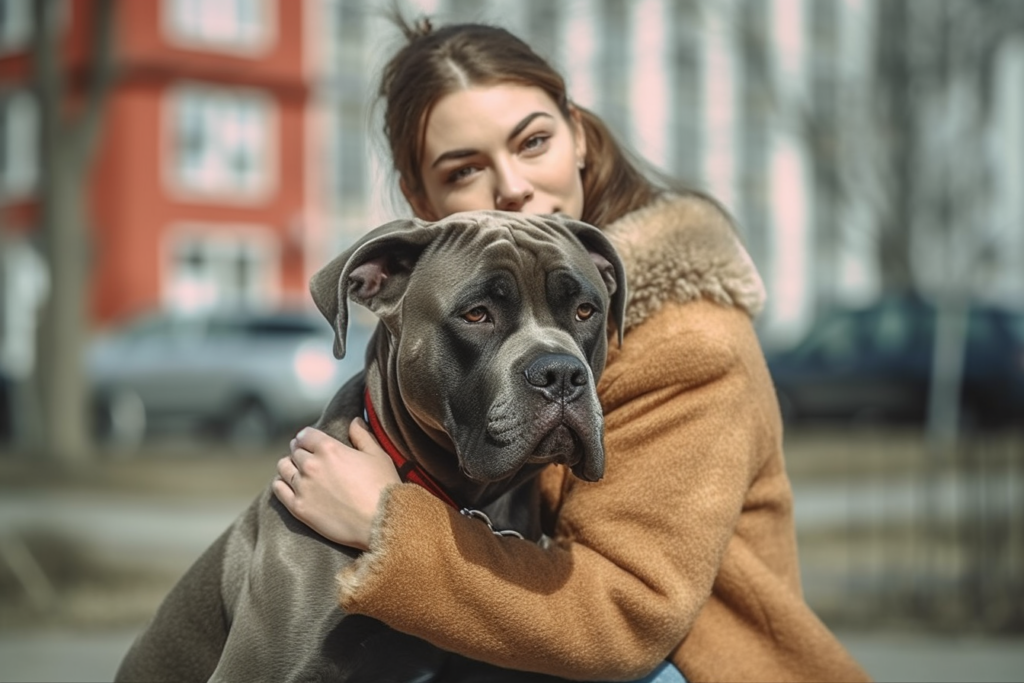- Characteristics of the Cane Corso
- How big are Cane Corsos?
- Different coats for Cane Corsos
- A brief history of the Cane Corso, from a real* Cane Corso
- Caring for Cane Corsos
- Feeding, diet, and nutrition of a Cane Corso
- Health problems of Cane Corsos
- The Cane Corso personality
- How do Cane Corsos deal with children, people, and other pets?
- Adopting a Cane Corso
- How much does a Cane Corso cost?
- Getting pet insurance for your Cane Corso
The Cane Corso is a powerful and majestic Italian breed of mastiff, known for their strength, loyalty, and protective nature. These intelligent, versatile dogs make excellent family companions, working dogs, and guard dogs.
Because of their relatively high energy, Cane Corsos are a good fit for experienced dog owners who are committed to providing the necessary training, socialization, and exercise from puppyhood.
If you’re considering a Cane Corso as your next canine companion, read on.
Characteristics of the Cane Corso

Cane Corsos are large, muscular dogs with an unmistakable presence. Their strong and athletic bodies, coupled with a keen intelligence, make them versatile family members during their lifetime, which on average ranges 9-12 years.
Here’s a breakdown of the main characteristics of Cane Corsos, detailing their training, friendliness, adaptability, physical needs, and health needs using a rating scale of low, moderate, and high.
Training
| Characteristic | Rating |
|---|---|
| Ease of Training | Moderate |
| Intelligence | High |
| Prey Drive | Moderate |
| Tendency to Bark | Low |
| Wanderlust Potential | Low |
Friendliness
| Characteristic | Rating |
|---|---|
| Affection Level | Moderate |
| Kid-Friendly | Moderate |
| Dog-Friendly | Moderate |
| Stranger-Friendly | Low |
Adaptability
| Characteristic | Rating |
|---|---|
| Apartment-Friendly | Low |
| Good for Novice Owners | Low |
| Sensitivity Level | Moderate |
| Tolerates Hot Weather | Moderate |
| Tolerates Cold Weather | Moderate |
Physical considerations
| Characteristic | Rating |
|---|---|
| Energy Level | High |
| Exercise Needs | High |
| Playfulness | Moderate |
| Grooming Needs | Moderate |
Health considerations
| Characteristic | Rating |
|---|---|
| General Health | Moderate |
| Potential for Weight Gain | Moderate |
| Prone to Specific Health Issues | High |
How big are Cane Corsos?
Cane Corsos are known for their large, muscular stature! Their powerful presence is not only impressive but functional, as they were bred for protection and work.
On average, adult male Cane Corsos stand between 25 to 27.5 inches tall at the shoulder, while adult females measure around 23.5 to 26 inches. When it comes to weight, males can range from 99 to 110 pounds, and females typically weigh between 88 to 99 pounds.
Let’s take a closer look at how Cane Corso pups grow during their first two years. Keep in mind that the weights and sizes we list are averages, and don’t represent the entire Cane Corso breed.
Birth to 8 weeks
At birth, Cane Corso puppies typically weigh between 1 to 2 pounds. During their first 8 weeks, they will experience rapid growth, with their weight increasing to around 15 to 20 pounds. At this stage, their height may reach approximately 10 inches at the shoulder.
3 months to 6 months
Cane Corso puppies will continue to grow quickly. Their weight can range from 40 to 60 pounds, and their height may reach around 16 to 22 inches at the shoulder.
This is a critical period for their development, so providing proper nutrition and socialization is essential.
7 months to 12 months
Steady growth, with weight increasing to around 70 to 100 pounds. Their height at the shoulder can reach between 22 to 26 inches.
As they approach their first birthday, their growth rate may begin to slow down.
13 months to 24 months
Gradually reaching adult size. On average, Cane Corsos’ bone growth finishes at around 18 months.
Keep in mind that growth rates can vary depending on several factors—such as genetics, diet, and overall health.
Different coats for Cane Corsos
According to the American Kennel Club, the breed standard colors for a Cane Corso include:
- Black
- Gray
- Fawn
- Black Brindle
- Gray Brindle
- Red
- Chestnut Brindle
Any purebred dog can be pricey. And Cane Corsos can get more expensive if you’re looking for a particular type or look.
While the health of your pup should be your primary concern—more below on what questions you should ask a breeder!—you might also be interested in a Cane Corso with a particular look or color. Here are some of the coloration varieties to consider, but keep in mind that they may not be recognized by major kennel clubs.
Blue
A blue Cane Corso is a variety of the breed whose most noticeable physical characteristic is its coat color, which is a blue or grayish-blue hue. The color can vary from light to dark shades, and may also have brindle or black markings.
It’s controversial whether blue Cane Corsos exist at all.
Blue fawn or Formentino
The word “Formentino” comes from Italy (remember the Roman war dog relation?), and is used to describe the color of fermented wheat.
Formentino Cane Corsos have a light tan or fawn-colored coat that is sometimes described as a “pale brindle.”
Chocolate or Liver
While they may resemble the red Cane Corso, this pooch has a rich chocolate-colored coat that can range from a light milk chocolate to a dark chocolate color. The main distinction is the lack of pigmentation in their noses and the skin around their eyes give the game away.
Isabella or Tawny
This pooch’s light-colored—almost lilac—coat can range from a pale cream to a fawn-like beige color.
A brief history of the Cane Corso, from a real* Cane Corso

“My lineage dates back thousands of years to Italy, where my forefathers were bred as working dogs by ancient Romans. My ancestors, the ‘Molossers’, were powerful dogs and had various professions—like guarding livestock, property, and even participating in military combat.
As the Roman Empire expanded, my ancestors mingled with local breeds, leading to the development of yours truly (the modern Cane Corso).
Over the centuries, my predecessors continued to serve as versatile working dogs in Italy (what can I say, pasta doesn’t pay for itself). They herded cattle, hunted wild boar, and protected family estates. In the 20th century, we faced near extinction, but through the dedicated efforts of enthusiasts, our kind was revived in the 1970s.
We were officially recognized by the American Kennel Club (AKC) in 2010, and nowadays we’re pretty popular in the US—if I do say so myself—as loyal companions and fearless protectors.”
* Not really, but you get the gist.
Caring for Cane Corsos
Keeping a Cane Corso happy and healthy requires a large commitment from an early age. Make sure you’re up for the responsibility before bringing home a Cane Corso pup, which includes:
Living environment
A Cane Corso’s living environment should include enough space to move around comfortably and play and explore frequently. A house with a securely fenced yard is ideal.
Training
It’s essential to establish yourself as the pack leader to your Cane Corso pup. Early and consistent obedience training is crucial, as they can be strong-willed and independent. They respond best to positive reinforcement techniques.
Grooming
Cane Corsos have a short, dense coat that requires minimal grooming. Weekly brushing is recommended to remove loose hair and minimize shedding.
Exercise
As a high-energy working breed, Cane Corsos need 1 to 2 hours of daily moderate physical activity. Activities such as brisk walks, hiking, and playing fetch are ideal for keeping your pooch engaged and healthy.
It’s important to remember that Cane Corsos are prone to joint issues, so avoid high-impact exercises, particularly during their growing stage.
Mental stimulation
Cane Corsos additionally require mental stimulation to keep their minds sharp and engaged. Puzzle toys, obedience training, scent work, and sports—like agility, tracking, or search—are excellent ways to challenge your dog mentally.
Socialization
Properly exposing your Cane Corso to a variety of environments, people, and other animals from a young age—ideally between 3 to 14 weeks old—is essential to ensure they develop into well-rounded and confident adults, and prevent aggression and fear-based behaviors.
Health care
Regular veterinary check-ups are essential for monitoring your Cane Corso’s health and detecting any potential medical issues early. Your vet can provide guidance on vaccinations, parasite prevention, and dental care, as well as discuss any breed-specific health concerns (which we’ll discuss later).
Make sure to consult with your veterinarian before starting any new exercise or nutrition plan for your Cane Corso.
Feeding, diet, and nutrition of a Cane Corso
Feeding your Cane Corso a balanced and nutritious diet is crucial for maintaining their overall health and well-being. Be mindful of portion sizes and avoid overfeeding to prevent obesity, as this can contribute to joint issues and other health problems.
Nutritional balance
A Cane Corso’s diet should be tailored to the dog’s individual needs, taking into account factors such as age, weight, activity level, and overall health, but there are some general guidelines you can follow to provide a healthy diet for your pooch to help support their growth and development:
- High-quality protein: Cane Corsos are muscular dogs and require a diet rich in protein to support muscle growth and maintenance. Choose a high-quality dog food that has a named meat source (such as chicken, beef, or fish) as the first ingredient. The protein content should ideally be around 25-30% for adult dogs and around 30-35% for growing puppies.
- Balanced fat content: Look for dog food with a healthy fat content of around 14-18%. Essential fatty acids, such as omega-3 and omega-6 can also support overall health. Glucosamine and chondroitin can help support joint health.
- Carbohydrates and fiber: Choose dog food with complex carbohydrates, such as brown rice or sweet potatoes, and a fiber content of around 3-5% to help maintain a healthy digestive system.
- Vitamins and minerals: Vitamins A, C, and E, as well as minerals like calcium and phosphorus help promote strong bones and teeth.
Avoid dog foods with filler ingredients—such as corn, wheat, or soy—as these can contribute to food sensitivities and allergies.
Types of food
Each type of dog food—including dry kibble, canned wet food, raw, and home-cooked meals—has its benefits and drawbacks, and your choice will depend on your Cane Corso’s individual needs and preferences.
Consult with your veterinarian to determine the best option for your dog, and remember to choose a dog food that is specifically formulated for large breeds.
Feeding frequency
Cane Corsos should be fed according to their age, weight, and activity level. Puppies require more frequent meals as they are growing rapidly and need the additional energy.
Most Cane Corso puppies should eat 3-4 times a day until they are about six months old, and then gradually reduce the frequency to two meals a day as they mature.
Adult Cane Corsos typically do well with two meals per day, while seniors may require adjustments to their feeding schedule based on their activity levels and any health concerns.
Portion control
Monitor your Cane Corso’s food intake to prevent overeating and obesity, which can lead to health issues such as joint problems, heart disease, and diabetes.
If you’re unsure about the correct portion size for your Cane Corso, consult your veterinarian.
Treats
Treats can be a useful tool for training and rewarding your Cane Corso, but use them in moderation to prevent excessive calorie intake. Choose healthy, low-calorie treats that are appropriate for large breeds.
Supplements
Supplements—such as fish oil, joint supplements, or probiotics—could be beneficial for some Cane Corsos, but it’s essential to consult with your veterinarian before adding any supplements to your dog’s diet.
Health problems of Cane Corsos
Cane Corsos are generally healthy dogs, but they can still be prone to specific health issues.
Hip dysplasia
A genetic condition where the hip joint doesn’t develop properly, leading to arthritis and pain. Regular check-ups with your vet and maintaining a healthy weight can help reduce the risk of hip dysplasia.
Entropion
This is an eyelid disorder where the eyelid rolls inward, causing irritation and possible damage to the cornea. It may require surgery to correct the issue.
Bloat
Also known as Gastric Torsion, this life-threatening condition occurs when the stomach fills with gas and twists on itself. It requires immediate veterinary attention. Feeding smaller, more frequent meals and avoiding exercise immediately after meals can help prevent bloat.
Cardiac issues
Cane Corsos can be prone to heart problems such as dilated cardiomyopathy, a condition where the heart muscle becomes weakened and cannot pump blood efficiently. Regular check-ups and monitoring for signs of heart issues can help with early detection and management.
The Cane Corso personality

Cane Corsos are known for their intelligence, loyalty, and protective instincts. There are several key personality traits to be aware of, including:
- Loyalty: Cane Corsos are fiercely loyal to their families and are often described as gentle giants when around their loved ones. They will do anything to protect their family members and property.
- Intelligence: Cane Corsos are intelligent and eager to learn. They respond well to consistent and positive training methods, making them excellent working dogs and family pets.
- Confidence: This breed is naturally confident and assertive, which can be a double-edged sword. While their confidence makes them excellent protectors, it also means they need experienced handlers who can set boundaries and provide consistent leadership.
- Protective Instincts: With their natural guarding instincts, Cane Corsos can be wary of strangers and require proper socialization from a young age to ensure they can differentiate between friend and foe.
- Sensitivity: Despite their tough exterior, Cane Corsos can be quite sensitive and in tune with their owner’s emotions. They thrive on positive reinforcement and can become stressed or anxious if treated harshly.
- Adaptability: Cane Corsos can adapt well to various living situations, from city apartments to rural homes, as long as they receive adequate mental stimulation and physical exercise.
- Energy level: As a working breed, Cane Corsos have moderate to high energy levels and require regular exercise to keep them happy and healthy.
How do Cane Corsos deal with children, people, and other pets?
Cane Corsos can be excellent family pets when properly socialized and trained. They are usually gentle and patient with kids, but supervision is essential, especially with younger children who may not understand how to interact with a large dog.
It’s crucial to expose your Cane Corso to various people and environments from a young age to ensure they are comfortable around strangers.
Cane Corsos can also get along well with other dogs, feline family members, and smaller pets like rabbits and guinea pigs when properly socialized from an early age. Because of their size and strength, it’s still better to supervise interactions, especially with smaller animals, as their prey drive might cause them to chase.
Cane Corsos are no strangers to farm life, and can co-exist with livestock—like horses, cows, or goats—if trained and socialized. Don’t forget to monitor their interactions, as their natural protective instincts may kick in if they perceive a threat to their family or territory.
Adopting a Cane Corso
Adopting a Cane Corso can be a more affordable and rewarding option. Adoption fees typically range from $300 to $600 and usually include initial vet care, vaccinations, microchipping, and spaying or neutering.
Many rescue organizations and shelters have Cane Corsos in need of loving homes—both puppies and adults—including:
- Cane Corso Rescue, Inc.
- Must Love Corsos Rescue
- Big Dogs Huge Paws
- Biggies Bullies
- Second Chance Cane Corso Rescue
By choosing to adopt, you provide a deserving dog with a second chance at a happy life while also supporting rescue efforts.
How much does a Cane Corso cost?
A purebred Cane Corso from a breeder can cost between $1,500 to $4,000, with rarer coat colors ranging roughly $2,000-5,000 or more.
If you want to get into the nitty gritty of the lifetime costs of owning a Cane Corso, learn more here.
Getting pet insurance for your Cane Corso
Pet insurance helps cover the costs of your Corso’s medical expenses. You pay a monthly premium and in exchange, you can provide care for your fur fam without stressing as much about the costs.
With Lemonade dog insurance, for example, Cane Corso parents can customize their policy to get the coverage their furry friend needs.
For starters, a basic Lemonade pet health insurance policy includes accident and illness coverage. This will help cover the costs of tests, treatments, and medication if your dog—or cat—has an unexpected accident or illness.
A basic policy is great for the unexpected things in your fur fam’s future, but Lemonade also offers affordable preventative care packages, designed to keep your pet healthy, and helps cover expenses you’re probably already paying for.
By adding a preventive care package to a Lemonade policy you’ll be covered for all types of routine care—like annual wellness exams, checkups, blood tests, several vaccinations, dental cleanings, and other routine health care for your pet.
Get a quote for the best pet insurance plan for your furry friend.
A few quick words, because we <3 our lawyers: This post is general in nature, and any statement in it doesn’t alter the terms, conditions, exclusions, or limitations of policies issued by Lemonade, which differ according to your state of residence. You’re encouraged to discuss your specific circumstances with your own professional advisors. The purpose of this post is merely to provide you with info and insights you can use to make such discussions more productive! Naturally, all comments by, or references to, third parties represent their own views, and Lemonade assumes no responsibility for them. Coverage may not be available in all states.




